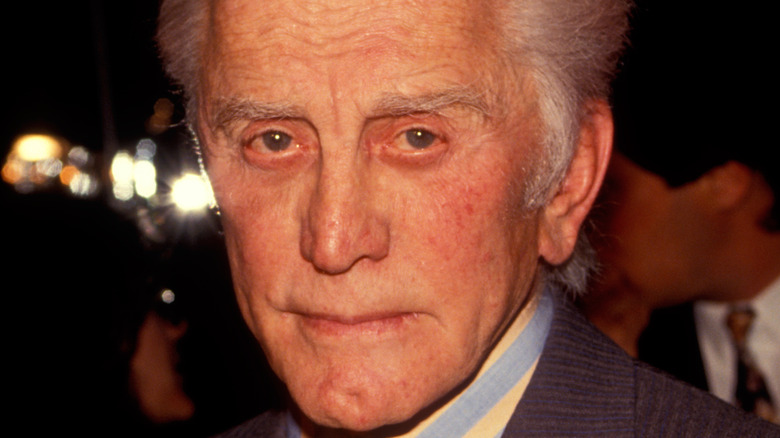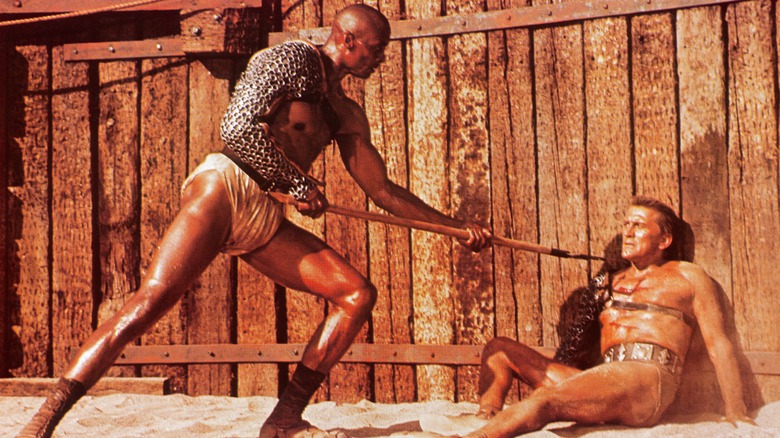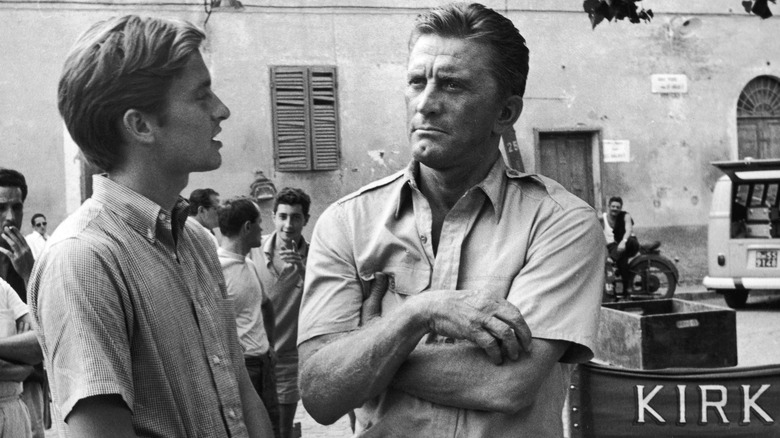Why Some Say Kirk Douglas Was One Of The Most Difficult Actors To Work With
Hollywood would never have been the powerhouse it became without the tireless efforts of true innovators. This applies to those who have worked in every facet of the movie industry. From the executives behind the scenes to the costume designers, script writers, artists, hairstylists, animators and everybody else who makes it all tick, an endless parade of wonderful people are to thank.That's why we should pay attention to the credits.
First and foremost, the names of the stars themselves are proudly emblazoned. These are the people who sell movie tickets, who inspire generations of children, and often command truly dizzying salaries for their services. The names of Hollywood movie stars from over the years are nothing less than immortal: Marilyn Monroe. Clark Gable. Charlie Chaplin. Grace Kelly.
According to its website, over 2,700 stars appear in the hallowed Hollywood Walk of Fame. While they aren't all assigned to acting legends, many are, and Kirk Douglas is just one such example. Numerous movie buffs have admired the stars in this famous sidewalk, surely wondering what it would have been like to work with these icons. In Douglas' case, it seems, he was a performer who took instructions from nobody and had his own cast-iron ideas of how scenes should play out.
Kirk Douglas' long career
As Britannica reports, Douglas (born Issur Danielovich in Amsterdam, New York, in 1916) took his first tentative steps on Broadway before and again after his stretch in the U.S. Navy (in which he served during 1943 and 1944), and by 1946, he was appearing in movies. "The Strange Love of Martha Ivers" marked his big screen debut.
From there, the actor embraced a wide range of parts, perhaps most famously that of Spartacus in the titular 1960 movie, a film he also produced and by which he helped break the Hollywood blacklist by hiring professionally exiled scriptwriter Dalton Trumbo. Douglas had one of the most prolific careers the business has ever known, as he discussed with Roger Ebert back in 1969. At the time, he had just completed his 50th movie, "There Was A Crooked Man." Of the milestone, he wryly stated, "it all amounts to ... staying power ... I was a star before I even heard of Julie Andrews." In the same interview, the star highlighted his stubborn and unbending views on the industry and how it functions. He told Ebert, "... critics are always writing about the juxtaposition of black and white and the existential dilemma and all that ... to disguise the fact that they don't understand the first damn thing about it either ..."
Douglas, clearly, was a prickly acting veteran who ensured his own viewpoint was voiced. He became a little infamous among his fellow actors for just that reason.
A forceful Hollywood personality like no other
Behind the scenes of his many great movie performances was a volatile and temperamental performer, it seems. According to People, Douglas has been deemed "a screaming bully who directed his directors, threw tantrums on the set and carried an armor-plated wallet." Some who worked very closely with him, including good friend and fellow star Burt Lancaster, agreed that his forceful personality made him difficult to work with. Lancaster would joke, per Reuters, "Kirk would be the first to admit he is a difficult person ... I would be the second."
Douglas seemed to have a way of asserting his authority on projects. According to Roger Ebert, Stanley Kubrick's "Paths Of Glory" script was a very different beast from the one Douglas was presented with, and the latter was having none of it, demanding it be as raw and hard-hitting as the final film would be. Douglas, it seemed, insisted that it be changed or the movie wouldn't be made. Per Robert Polito's book "Savage Art," "Perhaps the shrewdest way of summarizing the evolution of the various scripts is that 'Paths of Glory' was restyled steadily into a vehicle for Kirk Douglas."
Douglas had an indelible influence on the world on movies, not least for his contribution to ending the Hollywood blacklist. On set, it seems, he could be tricky.


